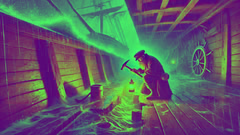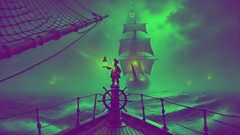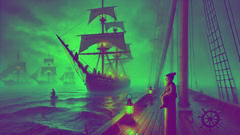Introduction
Salt air tangles in the hair and the creak of the rigging sets a rhythm only sailors truly hear. Across the vast, restless sweep of the Baltic Sea, the wind brings with it old stories—some whispered in the amber-lit corners of Lübeck taverns, others carved into the laughter and laments of weather-beaten captains. But none are as enduring as the legend of the Klabautermann, a name uttered in both gratitude and awe along the bustling harbors of 19th-century northern Germany. It is a legend that breathes beneath the deck boards, flickers in the lantern’s glow, and lingers in the misty pre-dawn hush when ships slip into open water. Every sailor, green or gray, knows that the sea is both provider and taker, a realm of beauty and danger—and that sometimes, just sometimes, it offers up a guardian whose loyalty is as deep as the ocean itself.
This tale follows the wind-tossed journey of The Morgenstern, a sturdy merchant brig whose fate would become forever entwined with the Klabautermann. Under the command of Captain Emil Weber—a man shaped by loss, pride, and the demands of a perilous trade—the crew set sail from Stralsund to Stockholm with their hold brimming with grain and hopes for a prosperous season. Yet, as the Baltic’s temperamental spring fog rolls in, strange occurrences begin to unsettle even the most stoic deckhands: ropes neatly coiled after storms, mysterious knockings below deck, and an uncanny sense that someone—or something—is watching over them. Some whisper of poltergeists, others of ill omen, but the older hands swap tales of a tiny, bearded sprite with sailor’s cap and pipe, hands forever busy with unseen repairs.
As the Morgenstern’s voyage unfolds, its crew faces tempests, mutinous fears, and the lure of greed. But it is the Klabautermann’s subtle guidance—seen only in fleeting glimpses, half-caught in the reflection of lantern light on brine-slicked planks—that gradually shifts their fate. Through harrowing nights and moments of quiet revelation, the sailors come to realize that the true heart of their legend lies not just in survival, but in the humility, courage, and unity demanded by the sea. The story of the Klabautermann is not only about rescue from disaster; it is about how a guardian spirit, as enigmatic as the waves themselves, can awaken what is best in those who dare to venture beyond the horizon.
Beneath the Boards: Signs and Whispers
The morning of the Morgenstern’s departure was thick with anticipation and a low, pearly fog that crept into every crevice along the Stralsund quay. Captain Emil Weber moved through the bustle with a weathered dignity, checking the last crates and exchanging measured nods with his first mate, Oskar. The crew, a mixture of young deckhands and salt-crusted old timers, busied themselves loading barrels and tightening lines. They barely noticed the small, odd footprints that appeared along the freshly scrubbed deck—prints far too diminutive for any human aboard.

By midday, the ship had slipped from the harbor, sails catching a shy, uncertain wind. Emil stood at the helm, his gaze cast eastward over gray-green water. For all his experience, he couldn’t shake a prickle at the back of his neck—a sense that another presence was aboard. It started with small things: ropes tangled when left unattended were found neatly coiled; knots expertly retied during rough patches; a hammer misplaced at night turning up just where needed by dawn. The galley’s kettle was filled and boiling, though no hand admitted to stoking the fire.
Oskar, a man with superstition stitched deep into his bones, was first to voice what others only dared to mutter. “It’s the Klabautermann, I’ll wager,” he told a circle of sailors one evening as the ship pitched gently under a veiled moon. “Seen his doings before—he’s a ship’s spirit, a good omen if you treat him right. But cross him, and…” He drew a finger across his throat with a grin that didn’t quite reach his eyes. The younger sailors snickered, but old Jürgen—gray-bearded and missing two fingers—just nodded solemnly.
A few days into open water, the wind shifted south, bringing heavier clouds and fretful waves. That night, as rain drummed against the deck, Emil was awoken by a steady tapping—like a child’s knuckles rapping wood—from the hold. Lantern in hand, he descended into the gloom, his boots echoing. He found nothing but the cargo, swaying gently in its lashings. Yet, when he turned to leave, he glimpsed a flicker of movement—a small shadow darting behind a barrel. The next morning, he discovered a split plank mended with a patch so fine it might have been conjured by magic.
The crew’s nerves grew taut as they traded stories of the sprite. A pipe’s faint scent on the wind. Laughter that seemed to come from nowhere. A handful of coins left near a broken hatch. Some grew uneasy, suspecting a trickster or a warning of doom. Yet, in moments of trouble—when a sudden squall knocked a lantern loose or a lifeline came undone—the disaster was somehow averted at the last instant. Even Emil, skeptical as he was, started to leave out bits of bread and cheese on an empty barrel, a quiet thank you to whatever watched over them. The Klabautermann’s presence was never seen head-on, but he was there, in every fortunate turn and narrow escape.
As the days lengthened and the Baltic’s moods grew more changeable, whispers of the sprite became woven into daily ritual. Sailors touched their caps before descending below deck. Oskar hung a tiny wooden carving from the mast as a token. The Morgenstern glided on, its crew bound together not just by duty or fear, but by a sense of unseen companionship—a guardian whose loyalty was as unpredictable as the sea itself.
Tempest and Temptation: The Spirit’s Test
On the seventh night at sea, as the Morgenstern skirted the shadowed islands of Rügen, the weather turned. A wall of storm clouds rose on the horizon, and the air thickened with ozone. Emil sensed trouble and ordered all hands on deck. The first gusts battered the sails; rain slashed sideways, blinding the crew. Lightning stitched the sky in jagged patterns. Oskar barked orders, but panic crept in with every wave that smashed over the gunwales. The youngest sailor, Dieter, lost his footing and nearly tumbled into the churning sea—only for a loose line to whip around his waist, pulling him back as if by an invisible hand.

Below deck, as the ship groaned and shuddered, Emil heard the same rhythmic tapping—only louder, more urgent. He followed it to the main hold and found water seeping through a seam near the keel. In the flickering lantern glow, he saw a curious sight: a tiny figure with a bushy beard, clad in oilskin and cap, pipe clamped between his teeth, hammering furiously to plug the leak. The sprite paused, met Emil’s stunned gaze, and nodded once before vanishing into shadow.
The captain was jolted into action. He called for buckets and madehift repairs, guiding his men with new resolve. The storm raged until dawn, but the Morgenstern held together—just barely. When the light returned, they found the hull patched tight, a ship’s bell newly polished, and all hands accounted for. The legend of the Klabautermann was no longer just a story. Emil’s skepticism crumbled, replaced by wonder and humility.
Yet with survival came new tension. As they neared the Swedish coast, they were hailed by a rival merchant vessel whose captain boasted of high profits from secret contraband routes. Temptation took hold of some crew members—whispers of riches and easy gain. Oskar overheard mutinous talk and confided in Emil, who called the crew together beneath the billowing sails. He spoke not only of discipline and duty but of gratitude for the spirit who had saved them. “We’re watched, friends—not just by each other, but by something older than any law. The sea has its own eyes. We owe our lives to the one below our boards.”
That night, as if to reinforce his words, the galley kettle boiled over with sweet-smelling steam, and every sailor found a small token—a carved shell, a bit of amber, a perfect knot—on their bunks. The atmosphere shifted. Some wept quietly, others sang old sea shanties. The lure of easy fortune faded before the deeper wealth of camaraderie and respect for their vessel and its unseen guardian.
The storm had not only tested their seamanship, but their character. The Klabautermann, it seemed, had measured their worth—and found them, for now, deserving of his watchful care.
The Reckoning: Redemption at Sea
Days passed in uneasy peace. The Morgenstern sailed north along the Swedish coast, its crew shaken but stronger for their ordeal. Yet a shadow lingered over Captain Emil. He’d grown up a shipbuilder’s son in Rostock, his father lost to a sudden squall decades before. That grief had long hardened into resolve, but now, the memory returned sharper than ever—especially when he thought of the Klabautermann’s intervention. Was this sprite merely fate’s plaything, or something more personal, more forgiving?

As the crew repaired storm damage and patched sails, rumors spread of a hidden reef notorious for wrecking even seasoned ships. The weather grew unpredictable: fog settled in thick blankets, muffling all sound and swallowing even the sun by midday. Emil became restless, pacing decks and studying charts. Oskar urged caution, suggesting they drop anchor until visibility improved. But their deadline pressed; merchants awaited their grain in Stockholm, and time was money.
That evening, as dusk bled into night, Dieter reported hearing the sprite’s laughter in the rigging. Emil allowed himself a small smile—the Klabautermann’s presence had become oddly comforting. He stood alone at the bow, peering into the mist. Suddenly, a bell rang out—a warning from nowhere. Emil ordered the ship to veer hard starboard just as a dark mass loomed off the port side. The Morgenstern scraped past a jagged reef, splinters flying but hull intact. In the confusion, Emil glimpsed the sprite atop the bowsprit, tiny hat cocked, pipe glowing. The danger had passed by inches.
But then calamity struck. A greedy crewman named Franz, emboldened by his own brush with disaster, snuck below to steal from the stores. He was caught by Jürgen, and a scuffle broke out that knocked over a lantern. Flames licked at the deck boards; smoke billowed upward. Panic threatened to undo all the unity forged since the storm.
Emil acted with decisive force. He ordered buckets, formed a human chain, and doused the fire before it could reach the sails. Through the chaos, the Klabautermann’s laughter rang louder—a peal of warning and rebuke. When the smoke cleared, Franz stood shamefaced and trembling. Emil could have thrown him overboard or left him to fate. Instead, he pronounced a different sentence: “You’ll work double watches, Franz, and learn what it means to serve your ship—not just yourself. And you’ll be the first to thank our guardian tonight.”
The crew gathered around the mast as twilight deepened. Emil led them in a quiet ritual—leaving out bread, pouring a thimble of rum overboard in thanks, and singing an old song of safe harbors and loyal hearts. For the first time, he spoke openly of his father’s fate and his own fear of never being good enough to lead. The Klabautermann, he said, had taught him that leadership wasn’t just about command, but about trust—of one another and of the mysteries that govern the sea.
The weeks that followed were calmer. The weather softened; the ship sailed true. When they finally arrived in Stockholm’s bustling port, their cargo safe and spirits high, every sailor—Emil most of all—felt changed. And as they left the ship for shore leave, each man glanced back at the Morgenstern’s deck, half-expecting to see a bearded sprite watching from the shadows, pipe smoke curling in salute.
Conclusion
The legend of the Klabautermann endured long after the Morgenstern’s voyage faded into memory. In every port along the Baltic—whether in hushed tavern tales or in the nervous glances of sailors before casting off—his name was spoken with reverence and gratitude. For Captain Emil Weber and his crew, the encounter with their ship’s guardian had become more than just an oddity or superstition; it was a lesson written in salt, wind, and hard-won humility. The Klabautermann taught them that the sea rewards those who respect its power, cherish their comrades, and honor even the unseen hands that guide them through darkness. He was a spirit of warning and mercy, mischief and repair—a reminder that courage sometimes comes in forms smaller than expected and that unity is built not only on discipline but also on wonder.
To this day, when storm clouds gather on the Baltic and sails are trimmed against rising wind, some say you can catch a fleeting glimpse of a tiny figure tending to the lines or hear laughter on the spray. Sailors still leave bread and cheese in quiet corners below deck, just in case their Klabautermann is near—watching, mending, and reminding all who venture out that even in the loneliest stretches of sea, no one is ever truly alone.













